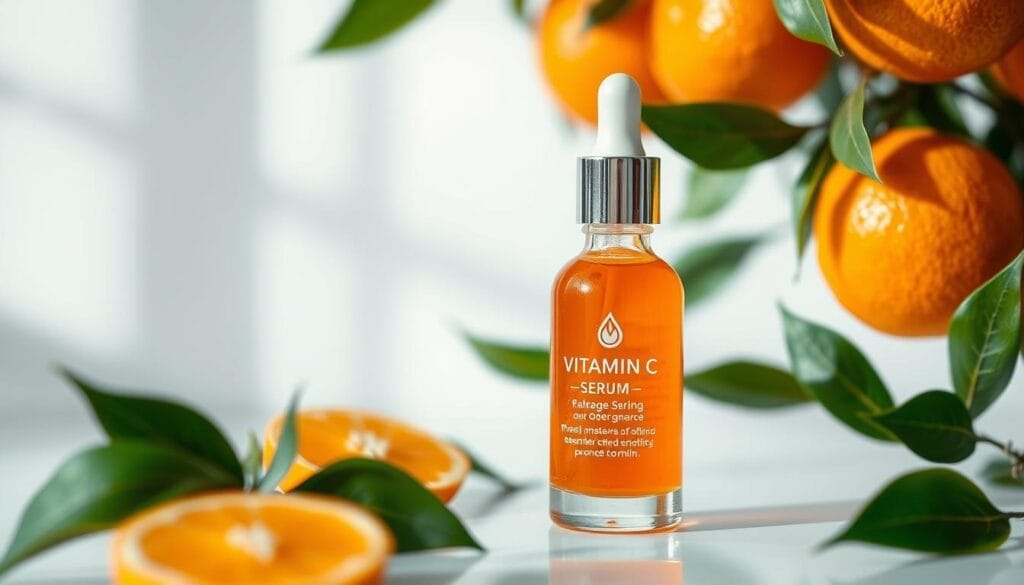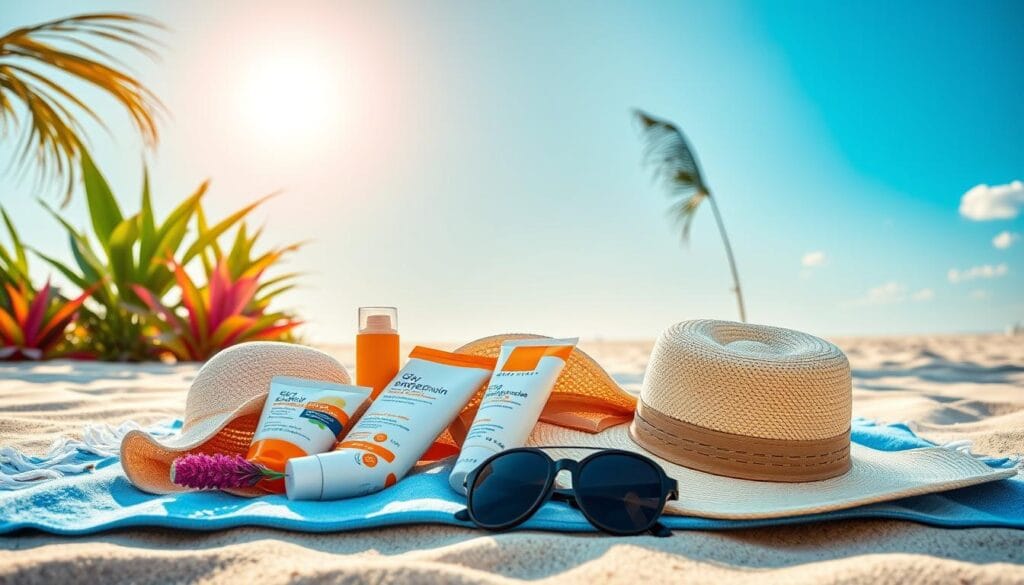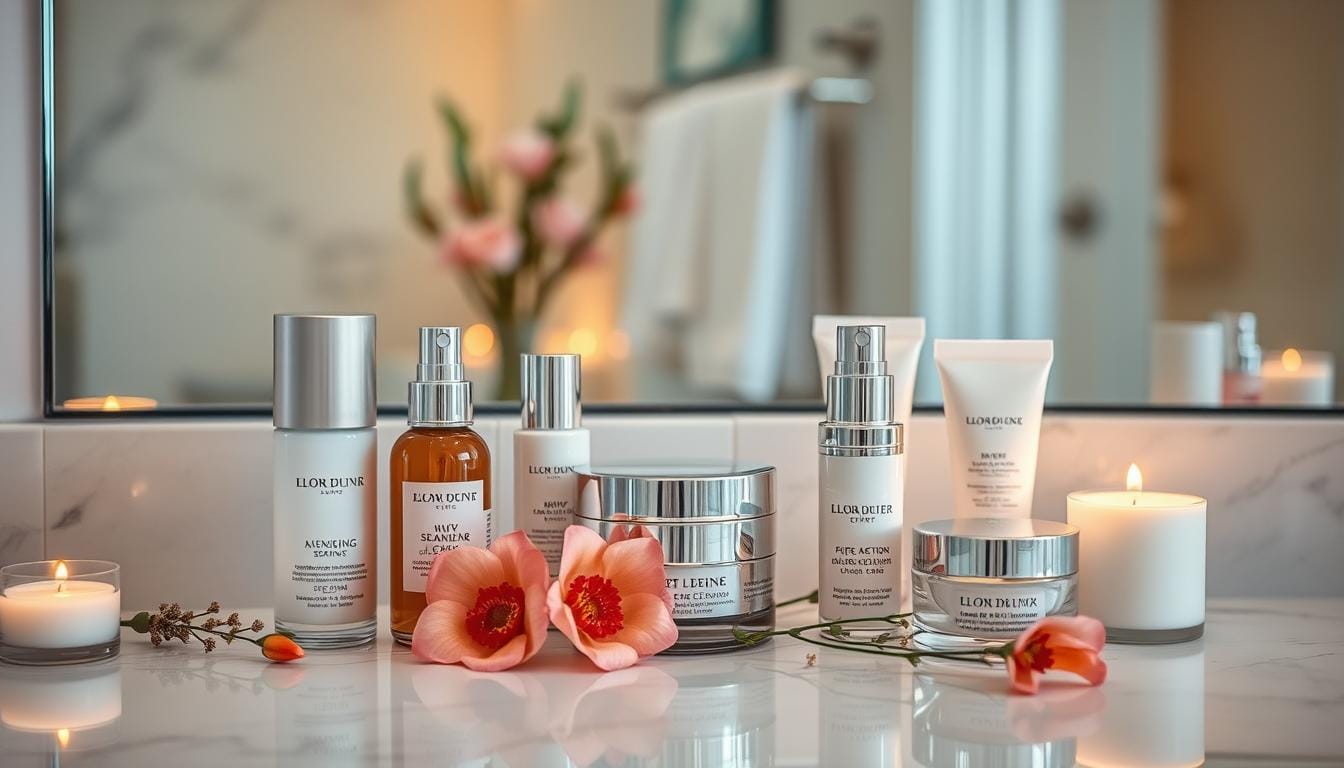As we age, our skin battles time, stress, and lifestyle choices. But, you can fight the signs of aging. The right skincare can keep your skin looking young and bright. This guide will show you how to create the best anti-aging skincare routine, based on expert advice.
Dr. Dendy Engelman says starting early is key. “Even a simple routine of cleanser and sunscreen can prevent early aging,” she notes. Dr. Michele Henry and Shani Darden share their knowledge to help you look younger than your years.
Table of Contents
Understanding Skin Aging: Signs and Causes
As you age, it’s important to know about skin aging signs and causes. Focusing on wrinkle reduction, collagen boost, and sun damage prevention helps keep your skin looking young and vibrant.
Common Signs of Aging Skin
Signs of aging skin include fine lines, wrinkles, dark spots, and a dull complexion. These changes happen naturally but can get worse due to various factors.
Factors Affecting Skin Aging
- Genetics: Your genetic makeup greatly influences how your skin ages.
- Stress: High stress can make wrinkles and fine lines appear sooner.
- Environment: UV rays, pollution, and other environmental factors can harm your skin and cause early aging.
- Lifestyle: Smoking, a poor diet, and not enough sleep can harm your skin’s health and appearance.
When to Start Anti-Aging Care
Signs of aging usually start in the 30s. But, starting preventive care in your 20s and 30s can help. Using collagen-boosting and sun damage prevention strategies early can tackle aging signs before they worsen.
Consistency and sticking to your skincare routine are crucial for anti-aging. Using ingredients like retinol, hyaluronic acid, and vitamin C can reduce wrinkles and fine lines. They also help your skin look more radiant and youthful.
Essential Anti-Aging Ingredients for Youthful Skin
To get a youthful, glowing look, you need to use the right skincare ingredients. Retinol serums, vitamin C, and hydrating moisturizers are key. They tackle aging issues like fine lines, uneven skin, and loss of firmness.
Retinol is a top choice for anti-aging. It boosts collagen, speeds up skin renewal, and reduces wrinkles. Vitamin C is also vital. It fights off environmental damage that speeds up aging.
| Ingredient | Key Benefits |
|---|---|
| Retinol | Boosts collagen, improves skin texture, reduces fine lines and wrinkles |
| Vitamin C | Brightens skin, provides antioxidant protection, stimulates collagen production |
| Hyaluronic Acid | Deeply hydrates, plumps skin, minimizes the appearance of fine lines |
| Niacinamide | Reduces inflammation, evens out skin tone, improves barrier function |
| Peptides | Stimulate collagen and elastin production, improve skin firmness |
Don’t forget about alpha-hydroxy acids (AHAs) like glycolic acid. They boost collagen and elastin. Vitamin E is also important. It protects the skin and keeps it healthy.
Using a mix of these ingredients daily can fight aging signs. You’ll get a younger, brighter look.
Morning Anti-Aging Skincare Routine
As you age, your skin changes a lot. A good morning routine can fight the signs of aging. Begin with a gentle cleanser to keep your skin’s natural oils and moisture.
This step is key for the firming facial treatments and natural anti-aging ingredients that come next.
Gentle Cleansing Techniques
Choose a creamy, milky, or oil-based cleanser. It should remove dirt without harming your mature skin. Stay away from harsh, foaming cleansers. They can dry out and irritate your skin.
Toning and Preparation
If your skin is oily or prone to acne, use a gentle, alcohol-free toner. It balances your skin’s pH and prepares it for other products. For dry or sensitive skin, a hydrating toner adds extra moisture.
Daytime Product Application Order
- Vitamin C serum: Begin with a vitamin C serum to brighten and protect your skin.
- Targeted treatments: Use serums or treatments for specific issues, like wrinkles or dryness.
- Moisturizer: Apply a moisturizer to keep your skin hydrated and firm.
- Sunscreen: Finish with a broad-spectrum sunscreen to protect against UV rays.
Following these steps in your morning routine can make your skin look brighter and younger. It’s all thanks to natural anti-aging ingredients.
The Power of Vitamin C and Antioxidants
Vitamin C is a top skincare hero. It fights aging and protects against damage. It stops free radicals from UV rays and pollution, keeping your skin young.
Vitamin C also helps even out your skin tone. It stops melanin production, fading dark spots. This makes your skin look smoother and more even.
Vitamin C does more than just protect. It boosts collagen for firmer skin. It also reduces redness and inflammation, making your skin look healthier.
Using vitamin C on your skin keeps it protected. Even after facing environmental stress, it keeps working.
Antioxidants like vitamin C and vitamin E are key for anti-aging. They fight signs of aging like wrinkles and dark spots. They also protect your skin from UV rays and pollution.
For the best anti-aging results, look for products with vitamin C serums and other antioxidants. Products like Liquid Courage Antioxidant Serum by Gentlerist offer top benefits. They protect your skin from aging and environmental damage.

“Vitamin C is considered the ultimate skincare antioxidant by many experts in the beauty industry.”
Hydration and Moisturizing Strategies
Keeping your skin hydrated is key to looking young and radiant. As we get older, our skin loses moisture. This leads to dryness, fine lines, and a dull look. Using hydrating moisturizers and facial oils can greatly improve your skin.
Best Moisturizers for Aging Skin
Choose moisturizers with peptides and ceramides. These help keep your skin’s barrier strong and hold moisture in. Hyaluronic acid adds extra moisture, while vitamin C fights off aging caused by the environment.
Facial Oils and Their Benefits
Facial oils are a game-changer for dry skin. Oils like rosehip and sea buckthorn are full of omega fatty acids. They deeply nourish your skin. Use a few drops before your moisturizer for extra hydration and a youthful glow.
Hydration is essential for healthy, young-looking skin. Add these moisturizers and oils to your daily care for a plump, glowing face.
| Ingredient | Benefits |
|---|---|
| Peptides | Help rebuild the skin’s natural barrier and improve skin elasticity. |
| Ceramides | Replenish the skin’s lipid barrier, locking in moisture and preventing water loss. |
| Hyaluronic Acid | Deeply hydrates the skin, reducing the appearance of fine lines and wrinkles. |
| Vitamin C | Powerful antioxidant that protects against environmental stressors and boosts collagen production. |
| Rosehip Oil | Rich in omega fatty acids and antioxidants, helping to nourish and rejuvenate the skin. |
| Sea Buckthorn Oil | Provides deep hydration and helps to improve skin elasticity and texture. |
Adding these moisturizers and oils to your daily routine can greatly improve your skin’s look and health as you age.
Sun Protection: The Ultimate Anti-Aging Defense
Sun protection is key to preventing early skin aging. Sun exposure causes up to 90% of wrinkles and dark spots. It’s the main reason for visible signs of aging.
Protecting your skin from harmful UV rays is crucial for a youthful look. Always use broad-spectrum SPF 30 or higher sunscreen. Apply it well and reapply often, especially when outside for a long time.
- Zinc oxide and titanium dioxide in physical sunscreens block UVA and UVB rays.
- Chemical sunscreens like avobenzone turn UV radiation into harmless heat.
- Choose sunscreens with niacinamide, hyaluronic acid, and antioxidants for better protection.
Even on cloudy days, up to 80% of the sun’s UV rays can get through. So, sun protection is needed all year. Add SPF to your daily skincare routine to protect your skin from UV damage.
“Up to 90% of visible aging is caused by sun exposure, so sun protection is the most important anti-aging step you can take for your skin.”

By focusing on sun protection, you can keep your skin looking young and radiant. Remember, the best way to prevent sun damage is to use high-quality sunscreen consistently and follow sun-smart habits.
Anti-Aging Skincare Routine for Evening
As the sun sets, your skin starts to rejuvenate. This is the best time to fight aging and look young. Begin with a gentle double cleanse to remove the day’s dirt and makeup.
After cleaning, use a nourishing toner to balance your skin’s pH. Retinol serums are crucial for anti-aging. They boost collagen and reduce wrinkles.
Apply your retinol serum, then a hydrating firming facial treatment. Use a rich moisturizer to repair your skin while you sleep. Don’t forget to care for your eyes with a special eye cream.
Following these steps will help you keep your skin looking young. Remember, sticking to this routine every night is essential for the best results.
| Step | Product | Purpose |
|---|---|---|
| Double Cleanse | Vitamin C Cleansing Scrub | Removes makeup, oil, and impurities |
| Toning | Peptide Toner | Balances skin’s pH and prepares for serums |
| Serum | Retinol Serum | Stimulates collagen and smooths wrinkles |
| Moisturizer | Hydrating Night Cream | Replenishes and revitalizes skin overnight |
| Eye Cream | Brightening Eye Cream | Targets dark circles and puffiness |
“Consistency is key when it comes to an effective anti-aging regimen.”
Retinol and Other Night-Time Heroes
Retinol is a top choice for fighting aging signs. It’s known for preventing new wrinkles and smoothing out fine lines. But, start using it at night slowly to avoid skin irritation.
How to Incorporate Retinol
Begin with a low retinol concentration, like 0.3% in our Retinol Night Serum. It also has niacinamide and vitamin E to help your skin. Start using it a few times a week and increase as your skin gets used to it.
Alternative Night Treatments
If retinol doesn’t work for you, try alpha-hydroxy acids (AHAs) like glycolic acid. Our BHA/AHA Exfoliant has 2% salicylic acid and 1% natural AHAs. It gently exfoliates and brightens your skin. But, using both retinol and AHAs might need extra care, as a 1999 study showed they could affect each other’s effectiveness.
Listen to your skin and adjust your routine as needed. With some trial and error, you’ll get smoother, younger-looking skin.
| Product | Key Ingredients | Targeted Skin Concerns |
|---|---|---|
| Retinol Night Serum | 0.3% Retinol, Niacinamide, Vitamin E | Fine lines, wrinkles, uneven texture |
| BHA/AHA Exfoliant | 2% Salicylic Acid, 1% Natural AHAs | Dullness, uneven skin tone, congestion |
Specialized Treatments and Tools
When you’re working on your anti-aging skincare, think about adding special treatments and tools. Face masks can deeply hydrate and help your skin look younger. They make your skin look radiant.
At-home microneedling devices can also help your natural anti-aging ingredients work better. But, be careful with them, especially if you’re worried about skin color changes.
Exfoliating regularly is also important. It helps your skin look smoother and brighter. This makes your skin look even and shiny. You can choose firming facial treatments or simple chemical exfoliants.
Start slowly with these treatments and tools. Your skin might need time to get used to them. Always talk to a dermatologist like Ashley Magovern, M.D. or Whitney Bowe, M.D. They can help you use these safely for your skin type and needs.
FAQ
Can anyone start an anti-aging skincare routine?
Yes, anyone can start an anti-aging skincare routine. Even simple steps like using a cleanser and sunscreen can help, says Dr. Dendy Engelman, a board-certified dermatologic surgeon.
What are the common signs of aging skin?
Signs of aging skin include fine lines, wrinkles, dark spots, and dullness. Genetics, stress, environment, and lifestyle all play a role.
When do visible signs of aging typically appear?
Signs of aging often show in the 30s. But, starting preventive care early can help. Sun damage is a big contributor to early aging.
What are the key anti-aging ingredients?
Key ingredients include retinol, vitamin C, alpha-hydroxy acids (AHAs), vitamin E, collagen, and niacinamide. They help with fine lines, uneven skin, and loss of elasticity.
How does the morning anti-aging routine differ from the evening routine?
Morning starts with a gentle cleanser, then a toner for oily skin. Next, apply a vitamin C serum for protection and brightening. Finish with moisturizer and sunscreen. Evening involves double cleansing, toner, and retinol or night treatments.
Why is vitamin C important for anti-aging?
Vitamin C is a strong antioxidant. It protects against sun damage and free radicals. It also brightens and supports skin health.
How can I keep my skin hydrated for an anti-aging effect?
Use moisturizers with peptides and ceramides for skin integrity. For dry skin, apply facial oils before moisturizer. Hyaluronic acid serums add extra hydration.
Why is sun protection crucial for an anti-aging routine?
Sun damage depletes collagen and causes pigmentation. Use a broad-spectrum SPF 30+ sunscreen daily, even under makeup. Reapply often to prevent damage and aging.
How can retinol help with anti-aging?
Retinol is key for nighttime use. It prevents new wrinkles and smooths existing lines. Start with low doses and increase gradually to avoid irritation.
What specialized treatments can support an anti-aging routine?
Face masks offer deep hydration and collagen support. At-home microneedling devices improve product absorption. Regular exfoliation leads to smoother, brighter skin.


5 thoughts on “The Ultimate Anti-Aging Skincare Routine Guide”